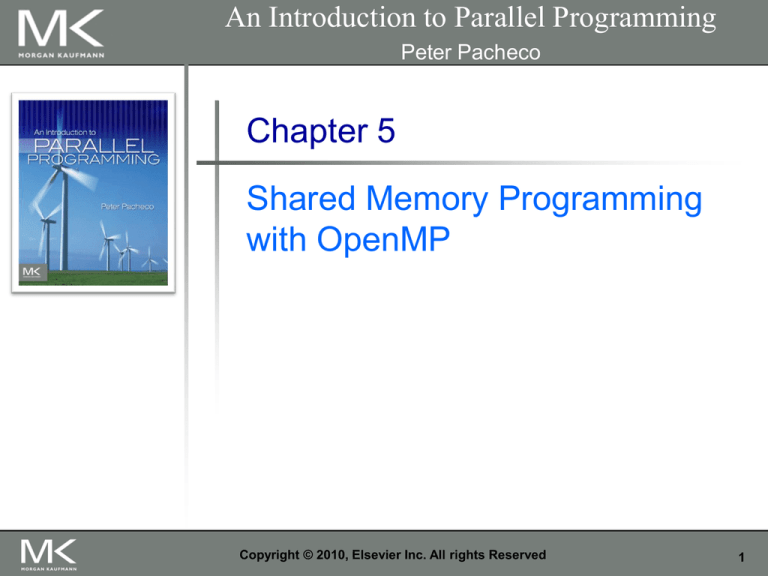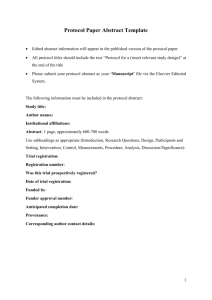
An Introduction to Parallel Programming
Peter Pacheco
Chapter 5
Shared Memory Programming
with OpenMP
Copyright © 2010, Elsevier Inc. All rights Reserved
1
Writing programs that use OpenMP.
Using OpenMP to parallelize many serial for
loops with only small changes to the source
code.
Task parallelism.
Explicit thread synchronization.
Standard problems in shared-memory
programming.
Copyright © 2010, Elsevier Inc. All rights Reserved
# Chapter Subtitle
Roadmap
2
OpenMP
An API for shared-memory parallel
programming.
MP = multiprocessing
Designed for systems in which each thread
or process can potentially have access to
all available memory.
System is viewed as a collection of cores
or CPU’s, all of which have access to main
memory.
Copyright © 2010, Elsevier Inc. All rights Reserved
3
A shared memory system
Copyright © 2010, Elsevier Inc. All rights Reserved
4
Pragmas
Special preprocessor instructions.
Typically added to a system to allow
behaviors that aren’t part of the basic C
specification.
Compilers that don’t support the pragmas
ignore them.
#pragma
Copyright © 2010, Elsevier Inc. All rights Reserved
5
Copyright © 2010, Elsevier Inc. All rights Reserved
6
gcc −g −Wall −fopenmp −o omp_hello omp_hello . c
. / omp_hello 4
compiling
running with 4 threads
Hello from thread 0 of 4
Hello from thread 1 of 4
Hello from thread 2 of 4
Hello from thread 3 of 4
possible
outcomes
Hello from thread 1 of 4
Hello from thread 2 of 4
Hello from thread 0 of 4
Hello from thread 3 of 4
Hello from thread 3 of 4
Hello from thread 1 of 4
Hello from thread 2 of 4
Hello from thread 0 of 4
Copyright © 2010, Elsevier Inc. All rights Reserved
7
OpenMp pragmas
# pragma omp parallel
Most basic parallel directive.
The number of threads that run
the following structured block of code
is determined by the run-time system.
Copyright © 2010, Elsevier Inc. All rights Reserved
8
A process forking and joining
two threads
Copyright © 2010, Elsevier Inc. All rights Reserved
9
clause
Text that modifies a directive.
The num_threads clause can be added to
a parallel directive.
It allows the programmer to specify the
number of threads that should execute the
following block.
# pragma omp parallel num_threads ( thread_count )
Copyright © 2010, Elsevier Inc. All rights Reserved
10
Of note…
There may be system-defined limitations on the
number of threads that a program can start.
The OpenMP standard doesn’t guarantee that
this will actually start thread_count threads.
Most current systems can start hundreds or even
thousands of threads.
Unless we’re trying to start a lot of threads, we
will almost always get the desired number of
threads.
Copyright © 2010, Elsevier Inc. All rights Reserved
11
Some terminology
In OpenMP parlance the collection of
threads executing the parallel block — the
original thread and the new threads — is
called a team, the original thread is called
the master, and the additional threads are
called slaves.
Copyright © 2010, Elsevier Inc. All rights Reserved
12
In case the compiler doesn’t
support OpenMP
# include <omp.h>
#ifdef _OPENMP
# include <omp.h>
#endif
Copyright © 2010, Elsevier Inc. All rights Reserved
13
In case the compiler doesn’t
support OpenMP
# ifdef _OPENMP
int my_rank = omp_get_thread_num ( );
int thread_count = omp_get_num_threads ( );
#else
int my_rank = 0;
int thread_count = 1;
# endif
Copyright © 2010, Elsevier Inc. All rights Reserved
14
THE TRAPEZOIDAL RULE
Copyright © 2010, Elsevier Inc. All rights Reserved
15
The trapezoidal rule
Copyright © 2010, Elsevier Inc. All rights Reserved
16
Serial algorithm
Copyright © 2010, Elsevier Inc. All rights Reserved
17
A First OpenMP Version
1) We identified two types of tasks:
a) computation of the areas of individual
trapezoids, and
b) adding the areas of trapezoids.
2) There is no communication among the
tasks in the first collection, but each task
in the first collection communicates with
task 1b.
Copyright © 2010, Elsevier Inc. All rights Reserved
18
A First OpenMP Version
3) We assumed that there would be many
more trapezoids than cores.
So we aggregated tasks by assigning a
contiguous block of trapezoids to each
thread (and a single thread to each core).
Copyright © 2010, Elsevier Inc. All rights Reserved
19
Assignment of trapezoids to threads
Copyright © 2010, Elsevier Inc. All rights Reserved
20
Unpredictable results when two (or more)
threads attempt to simultaneously execute:
global_result += my_result ;
Copyright © 2010, Elsevier Inc. All rights Reserved
21
Mutual exclusion
# pragma omp critical
global_result += my_result ;
only one thread can execute
the following structured block at a time
Copyright © 2010, Elsevier Inc. All rights Reserved
22
Copyright © 2010, Elsevier Inc. All rights Reserved
23
Copyright © 2010, Elsevier Inc. All rights Reserved
24
SCOPE OF VARIABLES
Copyright © 2010, Elsevier Inc. All rights Reserved
25
Scope
In serial programming, the scope of a
variable consists of those parts of a
program in which the variable can be used.
In OpenMP, the scope of a variable refers
to the set of threads that can access the
variable in a parallel block.
Copyright © 2010, Elsevier Inc. All rights Reserved
26
Scope in OpenMP
A variable that can be accessed by all the
threads in the team has shared scope.
A variable that can only be accessed by a
single thread has private scope.
The default scope for variables
declared before a parallel block
is shared.
Copyright © 2010, Elsevier Inc. All rights Reserved
27
THE REDUCTION CLAUSE
Copyright © 2010, Elsevier Inc. All rights Reserved
28
We need this more complex version to add each
thread’s local calculation to get global_result.
Although we’d prefer this.
Copyright © 2010, Elsevier Inc. All rights Reserved
29
If we use this, there’s no critical section!
If we fix it like this…
… we force the threads to execute sequentially.
Copyright © 2010, Elsevier Inc. All rights Reserved
30
We can avoid this problem by declaring a private
variable inside the parallel block and moving
the critical section after the function call.
Copyright © 2010, Elsevier Inc. All rights Reserved
31
I think we
can do
better.
Neither
do I.
I don’t
like it.
Copyright © 2010, Elsevier Inc. All rights Reserved
32
Reduction operators
A reduction operator is a binary operation
(such as addition or multiplication).
A reduction is a computation that
repeatedly applies the same reduction
operator to a sequence of operands in
order to get a single result.
All of the intermediate results of the
operation should be stored in the same
variable: the reduction variable.
Copyright © 2010, Elsevier Inc. All rights Reserved
33
A reduction clause can be added to a parallel
directive.
+, *, -, &, |, ˆ, &&, ||
Copyright © 2010, Elsevier Inc. All rights Reserved
34
THE “PARALLEL FOR”
DIRECTIVE
Copyright © 2010, Elsevier Inc. All rights Reserved
35
Parallel for
Forks a team of threads to execute the
following structured block.
However, the structured block following the
parallel for directive must be a for loop.
Furthermore, with the parallel for directive
the system parallelizes the for loop by
dividing the iterations of the loop among
the threads.
Copyright © 2010, Elsevier Inc. All rights Reserved
36
Copyright © 2010, Elsevier Inc. All rights Reserved
37
Legal forms for parallelizable for
statements
Copyright © 2010, Elsevier Inc. All rights Reserved
38
Caveats
The variable index must have integer or
pointer type (e.g., it can’t be a float).
The expressions start, end, and incr must
have a compatible type. For example, if
index is a pointer, then incr must have
integer type.
Copyright © 2010, Elsevier Inc. All rights Reserved
39
Caveats
The expressions start, end, and incr must
not change during execution of the loop.
During execution of the loop, the variable
index can only be modified by the
―increment expression‖ in the for
statement.
Copyright © 2010, Elsevier Inc. All rights Reserved
40
Data dependencies
fibo[ 0 ] = fibo[ 1 ] = 1;
for (i = 2; i < n; i++)
fibo[ i ] = fibo[ i – 1 ] + fibo[ i – 2 ];
note 2 threads
fibo[ 0 ] = fibo[ 1 ] = 1;
# pragma omp parallel for num_threads(2)
for (i = 2; i < n; i++)
fibo[ i ] = fibo[ i – 1 ] + fibo[ i – 2 ];
1 1 2 3 5 8 13 21 34 55
this is correct
but sometimes
we get this
1123580000
Copyright © 2010, Elsevier Inc. All rights Reserved
41
What happened?
1. OpenMP compilers don’t
check for dependences
among iterations in a loop
that’s being parallelized with
a parallel for directive.
2. A loop in which the results
of one or more iterations
depend on other iterations
cannot, in general, be
correctly parallelized by
OpenMP.
Copyright © 2010, Elsevier Inc. All rights Reserved
42
Estimating π
Copyright © 2010, Elsevier Inc. All rights Reserved
43
OpenMP solution #1
loop dependency
Copyright © 2010, Elsevier Inc. All rights Reserved
44
OpenMP solution #2
Insures factor has
private scope.
Copyright © 2010, Elsevier Inc. All rights Reserved
45
The default clause
Lets the programmer specify the scope of
each variable in a block.
With this clause the compiler will require
that we specify the scope of each variable
we use in the block and that has been
declared outside the block.
Copyright © 2010, Elsevier Inc. All rights Reserved
46
The default clause
Copyright © 2010, Elsevier Inc. All rights Reserved
47
MORE ABOUT LOOPS IN
OPENMP: SORTING
Copyright © 2010, Elsevier Inc. All rights Reserved
48
Bubble Sort
Copyright © 2010, Elsevier Inc. All rights Reserved
49
Serial Odd-Even Transposition Sort
Copyright © 2010, Elsevier Inc. All rights Reserved
50
Serial Odd-Even Transposition Sort
Copyright © 2010, Elsevier Inc. All rights Reserved
51
First OpenMP Odd-Even Sort
Copyright © 2010, Elsevier Inc. All rights Reserved
52
Second OpenMP Odd-Even Sort
Copyright © 2010, Elsevier Inc. All rights Reserved
53
Odd-even sort with two parallel for directives and two for directives.
(Times are in seconds.)
Copyright © 2010, Elsevier Inc. All rights Reserved
54
SCHEDULING LOOPS
Copyright © 2010, Elsevier Inc. All rights Reserved
55
We want to parallelize
this loop.
Assignment of work
using cyclic partitioning.
Copyright © 2010, Elsevier Inc. All rights Reserved
56
Our definition of function f.
Copyright © 2010, Elsevier Inc. All rights Reserved
57
Results
f(i) calls the sin function i times.
Assume the time to execute f(2i) requires
approximately twice as much time as the
time to execute f(i).
n = 10,000
one thread
run-time = 3.67 seconds.
Copyright © 2010, Elsevier Inc. All rights Reserved
58
Results
n = 10,000
two threads
default assignment
run-time = 2.76 seconds
speedup = 1.33
n = 10,000
two threads
cyclic assignment
run-time = 1.84 seconds
speedup = 1.99
Copyright © 2010, Elsevier Inc. All rights Reserved
59
The Schedule Clause
Default schedule:
Cyclic schedule:
Copyright © 2010, Elsevier Inc. All rights Reserved
60
schedule ( type , chunksize )
Type can be:
static: the iterations can be assigned to the
threads before the loop is executed.
dynamic or guided: the iterations are assigned
to the threads while the loop is executing.
auto: the compiler and/or the run-time system
determine the schedule.
runtime: the schedule is determined at runtime.
The chunksize is a positive integer.
Copyright © 2010, Elsevier Inc. All rights Reserved
61
The Static Schedule Type
twelve iterations, 0, 1, . . . , 11, and three threads
Copyright © 2010, Elsevier Inc. All rights Reserved
62
The Static Schedule Type
twelve iterations, 0, 1, . . . , 11, and three threads
Copyright © 2010, Elsevier Inc. All rights Reserved
63
The Static Schedule Type
twelve iterations, 0, 1, . . . , 11, and three threads
Copyright © 2010, Elsevier Inc. All rights Reserved
64
The Dynamic Schedule Type
The iterations are also broken up into chunks
of chunksize consecutive iterations.
Each thread executes a chunk, and when a
thread finishes a chunk, it requests another
one from the run-time system.
This continues until all the iterations are
completed.
The chunksize can be omitted. When it is
omitted, a chunksize of 1 is used.
Copyright © 2010, Elsevier Inc. All rights Reserved
65
The Guided Schedule Type
Each thread also executes a chunk, and when a
thread finishes a chunk, it requests another one.
However, in a guided schedule, as chunks are
completed the size of the new chunks
decreases.
If no chunksize is specified, the size of the
chunks decreases down to 1.
If chunksize is specified, it decreases down to
chunksize, with the exception that the very last
chunk can be smaller than chunksize.
Copyright © 2010, Elsevier Inc. All rights Reserved
66
Assignment of trapezoidal rule iterations 1–9999 using
a guided schedule with two threads.
Copyright © 2010, Elsevier Inc. All rights Reserved
67
The Runtime Schedule Type
The system uses the environment variable
OMP_SCHEDULE to determine at runtime how to schedule the loop.
The OMP_SCHEDULE environment
variable can take on any of the values that
can be used for a static, dynamic, or
guided schedule.
Copyright © 2010, Elsevier Inc. All rights Reserved
68
PRODUCERS AND
CONSUMERS
Copyright © 2010, Elsevier Inc. All rights Reserved
69
Queues
Can be viewed as an abstraction of a line of
customers waiting to pay for their groceries in a
supermarket.
A natural data structure to use in many
multithreaded applications.
For example, suppose we have several
―producer‖ threads and several ―consumer‖
threads.
Producer threads might ―produce‖ requests for data.
Consumer threads might ―consume‖ the request by
finding or generating the requested data.
Copyright © 2010, Elsevier Inc. All rights Reserved
70
Message-Passing
Each thread could have a shared message
queue, and when one thread wants to
―send a message‖ to another thread, it
could enqueue the message in the
destination thread’s queue.
A thread could receive a message by
dequeuing the message at the head of its
message queue.
Copyright © 2010, Elsevier Inc. All rights Reserved
71
Message-Passing
Copyright © 2010, Elsevier Inc. All rights Reserved
72
Sending Messages
Copyright © 2010, Elsevier Inc. All rights Reserved
73
Receiving Messages
Copyright © 2010, Elsevier Inc. All rights Reserved
74
Termination Detection
each thread increments this after
completing its for loop
Copyright © 2010, Elsevier Inc. All rights Reserved
75
Startup (1)
When the program begins execution, a
single thread, the master thread, will get
command line arguments and allocate an
array of message queues: one for each
thread.
This array needs to be shared among the
threads, since any thread can send to any
other thread, and hence any thread can
enqueue a message in any of the queues.
Copyright © 2010, Elsevier Inc. All rights Reserved
76
Startup (2)
One or more threads may finish allocating
their queues before some other threads.
We need an explicit barrier so that when a
thread encounters the barrier, it blocks
until all the threads in the team have
reached the barrier.
After all the threads have reached the
barrier all the threads in the team can
proceed.
Copyright © 2010, Elsevier Inc. All rights Reserved
77
The Atomic Directive (1)
Unlike the critical directive, it can only
protect critical sections that consist of a
single C assignment statement.
Further, the statement must have one of
the following forms:
Copyright © 2010, Elsevier Inc. All rights Reserved
78
The Atomic Directive (2)
Here <op> can be one of the binary operators
Many processors provide a special loadmodify-store instruction.
A critical section that only does a load-modifystore can be protected much more efficiently
by using this special instruction rather than
the constructs that are used to protect more
general critical sections.
Copyright © 2010, Elsevier Inc. All rights Reserved
79
Critical Sections
OpenMP provides the option of adding a
name to a critical directive:
When we do this, two blocks protected
with critical directives with different names
can be executed simultaneously.
However, the names are set during
compilation, and we want a different critical
section for each thread’s queue.
Copyright © 2010, Elsevier Inc. All rights Reserved
80
Locks
A lock consists of a data structure and
functions that allow the programmer to
explicitly enforce mutual exclusion in a
critical section.
Copyright © 2010, Elsevier Inc. All rights Reserved
81
Locks
Copyright © 2010, Elsevier Inc. All rights Reserved
82
Using Locks in the MessagePassing Program
Copyright © 2010, Elsevier Inc. All rights Reserved
83
Using Locks in the MessagePassing Program
Copyright © 2010, Elsevier Inc. All rights Reserved
84
Some Caveats
1. You shouldn’t mix the different types of
mutual exclusion for a single critical
section.
2. There is no guarantee of fairness in
mutual exclusion constructs.
3. It can be dangerous to ―nest‖ mutual
exclusion constructs.
Copyright © 2010, Elsevier Inc. All rights Reserved
85
Matrix-vector multiplication
Copyright © 2010, Elsevier Inc. All rights Reserved
86
Matrix-vector multiplication
Run-times and efficiencies
of matrix-vector multiplication
(times are in seconds)
Copyright © 2010, Elsevier Inc. All rights Reserved
87
Thread-Safety
Copyright © 2010, Elsevier Inc. All rights Reserved
88
Concluding Remarks (1)
OpenMP is a standard for programming
shared-memory systems.
OpenMP uses both special functions and
preprocessor directives called pragmas.
OpenMP programs start multiple threads
rather than multiple processes.
Many OpenMP directives can be modified
by clauses.
Copyright © 2010, Elsevier Inc. All rights Reserved
89
Concluding Remarks (2)
A major problem in the development of
shared memory programs is the possibility
of race conditions.
OpenMP provides several mechanisms for
insuring mutual exclusion in critical
sections.
Critical directives
Named critical directives
Atomic directives
Simple locks
Copyright © 2010, Elsevier Inc. All rights Reserved
90
Concluding Remarks (3)
By default most systems use a blockpartitioning of the iterations in a
parallelized for loop.
OpenMP offers a variety of scheduling
options.
In OpenMP the scope of a variable is the
collection of threads to which the variable
is accessible.
Copyright © 2010, Elsevier Inc. All rights Reserved
91
Concluding Remarks (4)
A reduction is a computation that
repeatedly applies the same reduction
operator to a sequence of operands in
order to get a single result.
Copyright © 2010, Elsevier Inc. All rights Reserved
92




